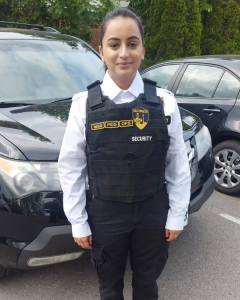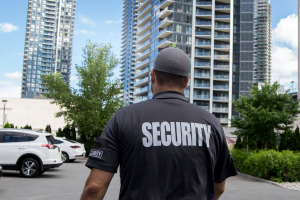When deciding between mobile security guards and static security, understanding the cost-benefit balance is key. Mobile patrols offer flexibility by covering multiple sites with scheduled or random visits, making them a cost-effective choice for large residential areas or construction properties that require broad but intermittent security coverage.These patrols can include routine security checks and patrol inspections, helping deter unwanted activity and respond to potential threats.
On the other hand, static guards provide constant on-site physical security, presence ideal for retail locations where customer interaction and access control are important, though at a higher hourly rate. While mobile guards reduce overall expenses through scalable services, static security excels in visible deterrence, continuous monitoring, and faster emergency response when incidents occur in high-traffic areas. Choosing the right option depends on property type, risk level, and budget considerations to achieve effective protection without unnecessary costs.
Choosing the Right Security Type for Your Property
Selecting the right security solution depends on your property’s size, layout, and specific risk profile. Larger or spread-out sites benefit from mobile security guards who cover multiple areas efficiently through scheduled or randomized patrols. These services adapt well to evolving needs or expanding perimeters. If your property experiences frequent incidents such as theft, vandalism, or trespassing; common concerns according to 2023 Statistics Canada crime data; you’ll need a security presence that matches the threat level. Static guards are often a better fit for properties requiring constant monitoring, access control, and customer interaction, such as retail stores or residential complexes with gated entry.
Budget also plays a significant role. Static guards usually cost more due to their full-time presence, but they offer immediate response and a strong visual deterrent. Mobile patrols are more cost-effective for intermittent coverage, though they may leave coverage gaps if not properly scheduled. For example, a construction site may use a static guard at the main gate during the day and mobile patrols at night, balancing both cost and coverage.
Legal or insurance policies might also influence your choice. Some require a constant on-site presence for high-value assets. Properties with high foot traffic or a focus on visitor management typically benefit from static guards, thanks to their customer-facing role and consistent presence. Conversely, mobile security is better suited for sites that need flexibility and can scale up or down based on activity levels or scheduling demands.
Ultimately, choosing between mobile and static security requires a clear understanding of your property’s layout, risks, and budget. Reviewing local crime trends, site activity, and coverage priorities will help you make the best choice.
Differences Between Mobile Security Guards and Static Security
Mobile security guards patrol multiple sites using marked security vehicles, following scheduled or random routes. This allows them to cover large or spread-out properties efficiently, responding quickly to alarms thanks to GPS tracking and control center dispatch. However, coverage gaps can occur between patrols since they are not continuously present at any one location.
On the other hand, static guards remain stationed at a single post for the full duration of their shift, providing a constant visual deterrent and direct interaction with customers or tenants. This makes them ideal for access control, visitor assistance, and monitoring high-traffic entrances. Static guards operate on hourly rates, reflecting their full-time presence and duties, which can lead to higher labour costs and the potential for idle time.
Meanwhile, security patrol services are generally charged per patrol or route, offering cost-effectiveness particularly for large properties or multiple sites. While mobile patrols excel in rapid alarm response and perimeter checks, they are less suited for roles requiring continuous presence or customer-facing responsibilities, which static guards handle better. Ultimately, the choice between the two depends on the specific security needs, site layout, and budget constraints of the property.
Security Options for Residential, Retail, and Construction Sites
Residential
Mobile patrols are effective for large neighbourhoods, apartment complexes, or vacant properties where full-time presence isn’t practical. Gated communities often use static guards at entry points combined with mobile patrols inside the premises for balanced security.
Retail
Static guards are the go-to option here. Their presence during store hours deters theft, manages customer flow, and provides on-the-spot help in case of incidents. A visible, interactive presence not only improves safety but also enhances the shopping experience.
Construction
These sites face risks like theft, trespassing, and vandalism. A popular solution is placing a static guard at the gate during work hours while using mobile security patrols to monitor the perimeter overnight. This approach offers coverage without needing multiple full-time security personnel and keeps the presence unpredictable, which helps deter intruders.
Comparing Costs: Mobile Patrols vs Static Guards
Mobile patrols typically cost around $35 per 20-minute visit, with additional charges for longer stays. For example, three nightly patrols could add up to about $1,000 per month. Static guards, by contrast, charge between $19 and $25 per hour depending on the shift and risk level. This can total between $6,500 and $9,500 monthly for 8 to 12-hour shifts.
While static guards provide consistent on-site presence, they often experience downtime that still incurs labour costs. Mobile patrols save money by covering multiple locations with fewer personnel, which works well for sites that don’t require constant monitoring. However, if not properly timed, mobile patrols may miss critical events, resulting in costly incidents.
When budgeting, consider not just hourly rates but also property size, the number of access points, risk complexity, and the value of rapid response. For example, a busy retail space may justify the higher cost of static security, while a construction site may benefit from broader, periodic mobile coverage.
How Flexibility and Coverage Affect Security Value
Mobile patrols offer flexibility by adjusting routes and schedules. They’re great for properties with fluctuating needs or multiple locations. GPS tracking and centralized dispatch enable quick alarm responses, enhancing responsiveness.
However, this flexibility can create blind spots between visits. Without careful planning, it leaves windows of vulnerability. Static guards, by contrast, provide continuous coverage that’s ideal for monitoring, visitor management, and routine security tasks.
They also excel in environments where familiarity and presence matter—like residential lobbies or office buildings. But static guarding can lack adaptability, especially during off-peak hours or emergencies.
Choosing the right balance often depends on whether you need steady visibility or adaptable response times. In many cases, combining both services—static coverage during peak hours and mobile patrols at night—delivers the most value.
Finding the Best Security Fit for Your Property
The right security setup depends on your property’s layout, level of risk, and operational needs. Mobile security guards are ideal for large or spread-out areas where flexibility and cost control are key. Static guards work best in high-traffic locations where continuous presence improves safety and service.
Evaluate your incident history, busiest hours, and vulnerability points. A hybrid model often delivers strong results; static coverage where visibility is needed and mobile patrols for wide or low-risk areas. Always consider how much downtime you’re paying for and whether your current setup responds quickly enough to real threats.
Speak with a security provider to tailor a plan that meets your specific requirements. Keeping your security strategy responsive to changes; whether in crime trends, property use, or regulations, will ensure long-term effectiveness and value.
How Ultimate Security Services Can Help
If you’re looking for flexible, efficient, and cost-effective protection for your property, Ultimate Security Services offers professional mobile security guard solutions. We specialize in mobile patrols tailored to the unique needs of residential, retail, and construction sites.
Our mobile guards are fully licensed, trained, and equipped with real-time GPS tracking and 24/7 dispatch support. This ensures quick response to alarms, visible deterrence, and thorough patrol documentation. Whether you need scheduled checks, random sweeps, or rapid alarm response, our mobile units are designed to adapt to your property’s risk profile and activity level.
We work closely with clients to assess site vulnerabilities, recommend patrol frequencies, and create customized security plans that meet insurance and operational requirements.
If you’re unsure whether mobile patrols are right for your site, we offer free site evaluations to help you understand your options and plan confidently. Book your free security assessment today and discover how Ultimate Security Services can help protect what matters most.
Frequently Asked Questions
1. How do mobile security guards enhance coverage compared to static guards?
Mobile security guards cover larger areas by regularly patrolling, which reduces the chances of blind spots and allows for quicker responses to incidents beyond a fixed post, unlike static guards who remain at one location.
2. In what ways does the presence of static security guards impact deterrence differently from mobile guards?
Static guards provide a constant, visible security presence that can discourage potential threats in high-risk or sensitive areas, while mobile guards offer less predictability, which can also deter crime by creating uncertainty for intruders.
3. What are the operational challenges faced when deploying mobile security guards over static ones?
Managing mobile guards requires effective communication and coordination to ensure full area coverage and timely incident reporting, whereas static guards have simpler logistical demands as they are stationed at a fixed point.
4. How does flexibility differ between mobile and static security guard services?
Mobile guards offer greater flexibility by adapting their patrol routes and schedules based on emerging risks or events, while static guards provide consistent surveillance at a designated spot but lack dynamic movement.
5. Can the combination of mobile and static security guards offer better protection than either method alone?
Yes, combining mobile and static guards can leverage the strengths of both approaches: static guards ensure persistent monitoring of critical points, while mobile guards cover wider areas and respond promptly to incidents, creating a layered security effect.
TL;DR This blog compares mobile security officers and static security, focusing on their suitability and cost-effectiveness for residential, retail, and construction properties in Canada. Mobile guards offer flexible, cost-efficient coverage by patrolling multiple sites and responding quickly to alarms, ideal for large or spread-out areas. Static guards provide a constant, visible presence with a focus on access control and customer interaction, making them better for retail and single-site needs. Costs vary, with mobile patrols generally cheaper than hourly static guards. A hybrid approach, such as used in construction sites, often balances cost and coverage. Ultimately, the choice depends on your property’s size, risk, and security goals.



